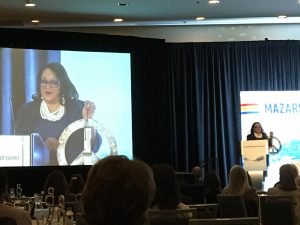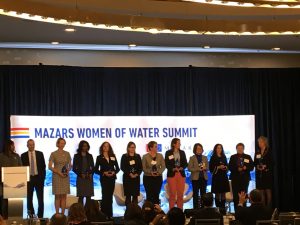Women of Water Summit recognizes female water-sector changemakers
Mazars USA (New York City, N.Y.), a financial consultancy active in the water sector, kicked off 2020 by hosting its inaugural Women of Water Summit in Arlington, Va., on Jan. 9.
The daylong summit featured industry leaders speaking in nine segments that celebrated outstanding achievements of female water professionals and offered tips to upcoming history-makers. Additionally, the summit provided the opportunity to help others develop in-roads to the sector, said David Gadis, CEO of DC Water (Washington, D.C.).
“We have to look like the communities we serve, and therefore, we need more women in the industry,” Gadis said in his opening remarks.
To celebrate Women’s History Month, here are some of the day’s most memorable remarks.
Practice CPR
Carla Reid, general manager and CEO of Washington Suburban Sanitation Commission Water (WSSC; Laurel, Md.), began the event with a keynote address. Reid is the first woman to serve in her position at WSSC, one of the largest utilities in the U.S. with a more-than-100-year history.

Carla Reid, keynote speaker for the Women of Water Summit that occurred on Jan. 9 in Arlington, Va., shows attendees her vision board. Mariah Walters Orose/WEF
Reid set an empowering tone for the day by dancing on stage to “Water Me” by Lizzo. The song, Reid explained, carries a vital message for leaders — especially women who lead. “I don’t get dehydrated; I moisturize it daily,” the song says, relating to Reid’s three points of self-care that helped her in her journey from civil engineer to industry leading executive. The secret is CPR, Reid said: confidence, persistence, and resilience.
Reid gave examples from her career where her confidence in her abilities, her persistence in achieving her goals, and her resilience to setbacks kept her on the path to becoming the CEO she is today.
Reid explained that when she identified an area of weakness in her skillset, she worked to build strength in that area. For example, as a civil engineer who aspired to be CEO, Reid said, she knew she would need human resources experience. She obtained her master’s degree in human resource management from the University of Maryland University College. The degree, she said, helped her greatly as a leader.
Today, Reid said, she practices self-care and goal setting by creating vision boards with empowering thoughts, words, and images on them. Her 2020 vision board is in the shape of a peace symbol. She also keeps a vision journal to record her goals, milestones, successes, and setbacks.
She encouraged aspiring leaders to invest in themselves.
“Learn as much as you can,” Reid advised. “Make sure you are prepared for every opportunity.”
Focus on Cybersecurity
Georgia Simpson, vice president of information technology at Middlesex Water Co. (Iselin, N.J.) encouraged water sector professionals to ensure they understand the value of cybersecurity. In her remarks, Simpson said the water sector has only recently started recognizing the necessity of cybersecurity.
“Cybersecurity touches every facet of the organization,” she said. “Cybersecurity is a business continuity issue. Cybersecurity impacts how an organization survives in business.”
Middlesex Water implemented cybersecurity risk and opportunity management strategies in 2014. In the event of a breach, Simpson said, it’s imperative for a utility to have protocols in place to handle it.
Follow The River of Opportunities
Brenda Burman, commissioner of the U.S. Bureau of Reclamation, spent her early career learning about the complex system of laws surrounding the Colorado River and the tribes and communities that depend on it. That experience earned her a call from Sen. Jon Kyl, R-Ariz., who hired her as his legislative counsel for water and energy before she joined the U.S. Department of the Interior. Burman is the first woman sworn-in to lead the Bureau of Reclamation.
“As we talk about women in water, I think it’s so important to think about those chances for experience,” Burman said. “Can you take them? Can you make that jump?”
Burman said she has benefitted from mentorships, but she’s also found tremendous value in daily networking.
“It’s who we meet every single day,” she said. “If you’re bringing your best game, people notice. If you’re passionate about your work, people notice.”
Build Awareness of Cultural Differences to Retain Diverse Talent
Sally Gutierrez is the acting director of the U.S. Environmental Protection Agency (EPA) Water Permits Division, and is the first Hispanic female career-appointment to the Senior Executive Service.
The EPA workforce is more than 50% women, she said. However, room for cultural and ethnic growth still remains. While hiring decisions are important, Gutierrez said, retention needs to be more of a focus area for environmental and water-sector groups.
She relayed an example about an effort to attract more Hispanic representation to an organization’s workforce. After robust efforts to hire well-qualified Hispanic employees, cultural barriers led to low retention rates for the hiring organization.
“There were some cultural parts to it,” Gutierrez said. “The supervisors started not understanding why [the Hispanic employees] wouldn’t look them in the eye. In the Hispanic culture, when you connect and draw your eyes down a little bit, it’s a sign of respect. But the supervisors were not prepared for what was coming at them. So, most of those wonderful recruitments … didn’t stay. To me, that was a profound lesson.”
Focusing on retention can make employees feel more valued in their organization and, ultimately, lead to better results for the water environment, Guttierez said.
“Contributing thoughts on successful efforts regarding diversity and inclusion may help the water sector in leveraging diversity for more successful organizations and bringing about improved water quality.”
Innovation Can Have A Big Impact Without Being A Big Invention

The recipients of the Top 10 Most Influential Women in Water awards stand with the masters of ceremonies at the Women of Water Summit. Mariah Walters Orose/WEF
The summit’s panel session on Innovation and Strategy opened with a video emphasizing that innovation creates new wealth, but it doesn’t always have to be a big invention. Lichter-Vincent reinforced that message.
“A Post-It note seems so simple,” Jackie Lichter-Vincent, the chief strategy and innovation officer at WSSC Water, said. However, it can be an effective tool.
Co-panelist Michelle Jung, chief of staff at SUEZ North America (Paramus, N.J.), said innovation is a vital driver for the water sector.
“If we don’t apply innovation to everything we do,” said Jung, “we honestly have no choice for our future.”
Lichter-Vincent advised the sector to work strategically across geographic and organizational boundaries on innovation. For example, she said, varying demands and policies between states around water supply and conservation can provide opportunities for innovators to carefully select the best place to perform pilot testing.
Not All Women Start in Water — And That’s Another Strength
Debra Coy, a partner at XPV Water Partners (Toronto, Ontario, Canada), addressed the “cross-pollination” of sector leaders. Coy, herself, was an English and journalism major in college. She entered the water sector via finance.
“No one gets out of college and says ‘I’m going to be a utility manager,’” agreed Heike Doerr, principal analyst at S&P Global Market Intelligence. Doerr said there’s often not a linear path to success in or outside the water sector. The key is searching for where you can add value.
Barbara Littlefield, chief financial officer at Poseidon Water (Boston, Mass.), noted that water is a last frontier – the final sector where women are making in-roads.
That’s something the panelists discussing Finance in the Water Sector hope will change as women take on more leadership roles. Panelists highlighted the positive traits women bring to the workforce.
“Women are more collaborative and willing to accept it’s not a zero-sum game,” said Usha Rao-Monari, senior adviser at Blackstone Infrastructure Group.
Mentorship Means Teamwork
Tifphani White-King, US National Tax Practice Leader for Mazars USA, moderator of a summit panel on mentorship and workforce issues, described how successful knowledge transfer is all about teamwork. White-King in 2014 became the first black woman to become a tax partner at Mazars USA.
|
Mazars USA presented its Top 10 Most Influential Women in Water awards to: 1. Eleanor Allen, CEO, Water For People 2. Christine Boyle, CEO & Founder, Valor Water Analytics 3. Debra Coy, Partner, XPV Water Partners 4. Adrienne Esposito, Executive Director, Citizens Campaign for the Environment 5. Nadine Leslie, CEO, SUEZ North America 6. Karen Pallansch, CEO, Alexandria Renew Enterprises 7. Karen Sands, Manager of Planning, Research and Sustainability, Milwaukee Metropolitan Sewerage District 8. Bernadette Sohler, Vice President, Corporate Affairs, Middlesex Water 9. Sarah Stevenson, Deputy Commissioner, Policy & Strategy, Philadelphia Water Department 10. Diane VanDe Hei, CEO, Association of Metropolitan Water Agencies |
“Part of my team was not just having a mentor but having a coach, having a mentor, and having a sponsor,” she said. “A coach will talk at you. A mentor will talk with you. And, a sponsor will talk for you when you are not able to be in the room and use your own voice. And those three roles were critical for my profession and acceleration.”
Pam Kenel, director of water resources at Loudon Water (Ashburn, Va.), said she that while she had no formal mentor, she did have several people who filled similar roles. One early influencer encouraged her to join a professional association, and she agreed to present at the summit because the American Water Works Association (AWWA; Denver) extended an invitation.
“There are a couple of great water organizations around here, the Water Environment Federation as well [as AWWA],” Kenel said. “Both of these organizations are focused on young professional programs. … I think these young professionals programs are critical to our industry.”
Jeanne Jensen, a project supervisor with the Town of Gilbert, Ariz. agreed that young professionals have valuable voices and contributions.
She encouraged attendees to provide young professionals room to grow within their organizations and communities. As summit panelists discussed mentorship and workforce issues, Jensen stressed that it is the responsibility of more experienced water professionals to pass their knowledge onto the next generation.
“If you want us to change the world, help us pull those tools out of the toolbox,” she said.
Communities Need to Recognize One Water
As the executive director of the WateReuse Association (Alexandria, Va.), Pat Sinicropi said she is fascinated by projects incorporating the One Water perspective — the idea that all water is connected and reused over time.
“It’s all wasted water if it isn’t being reused,” she said.
Sinicropi cited several city projects around the U.S. that have successfully incorporated recycled water.
“…Communities are looking at their water resources as really one water resource,” she said.
There are cities, however, that are struggling with sustainability, Sinicropi noted.
“New York City, as many of you know, has a huge CSO [combined sewer overflow] problem,” she said. “They are facing about a $6 billion long-term control plan to reduce their CSOs.”
Sinicropi lauded the Solaire residential high-rise project in New York, which claims the title of the first LEED-Certified building of its kind in the U.S., for its ability to reduce the amount of water heading to the city’s centralized collection points.
Karen Pallansch, CEO of Alexandria Renew Enterprises (Va.) said that the future of water recycling depends on “fit-for-use water.”
“Let’s focus on what we drink,” she said. “And the rest of it: How can we better utilize our water to get those resources where they need to be?”
— Mariah Walters Orose, WEF Highlights








March 17, 2020
Uncategorized